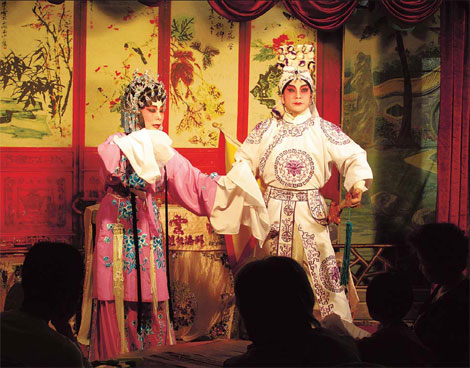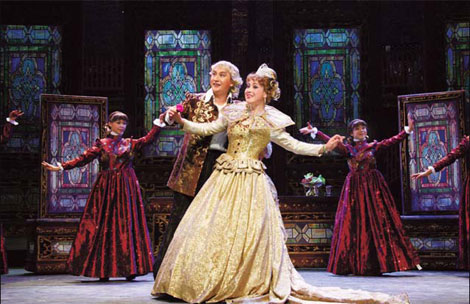Center
Afternoon at the opera
Updated: 2011-01-25 07:52
By Mu Qian (China Daily)
|
Cantonese Opera shows draw big crowds in some restaurants in Guangzhou, with low ticket prices and intimate environments. Mu Qian / China Daily |
|
Night Banquet in the Palace, adapted from a foreign story, is a part of Guangzhou Cantonese Opera Company's gala show Dazzling Colors of Canton. Provided to China Daily |
An ancient art form may be losing some of its appeal on the mainland but still packs in the crowds in Hong Kong as well among the Cantonese-speaking diaspora. Mu Qian reports.
Dressed in European aristocratic attire, the hero and heroine are having dinner in a set that looks like a palace in 19th-century Paris, but are singing to each other in Cantonese. This scene from Night Banquet in the Palace, a Cantonese Opera adapted from an American film, and pieces from classic Cantonese Opera repertory, such as Prime Minister for Six Kingdoms and Peony Pavilion, are all part of the show, Dazzling Colors of Canton.
Combining rare traditional folk arts with light-hearted banter by the two Cantonese-speaking hosts, the show takes audiences into the world of Cantonese Opera, an art form characteristic of Guangzhou, South China's Guangdong province.
Since July 2010, this production of Guangzhou Cantonese Opera Company has been in residence at Guangzhou's Nanfang Theater.
Ni Huiying, artistic director of the show and the company's president, says Dazzling Colors of Canton aims to represent the city and present the beauty of Cantonese Opera to tourists and locals alike. For non-Cantonese speakers, there are subtitles in Chinese and English.
"Ever since Cantonese Opera was inscribed on UNESCO's Representative List of the Intangible Cultural Heritage of Humanity in 2009, we have been thinking about how to display the charm of this art form through a performance," she says.
"We hope this work will show audiences not only Cantonese Opera's rich history, but also its fashionable side."
Guangzhou Cantonese Opera Company has invested more than 3 million yuan ($455,700) in the production. However, spectators have been few and far between since its debut, except for the period of the Asian Games when the government of Guangzhou sent tickets to its citizens as gifts. There was one night when only 17 tickets were sold.
Ranging from 50 to 280 yuan ($7.59-42.53), the ticket costs are about the same as for other theater shows in Guangzhou but more expensive than for most Cantonese Opera performances.
Apart from the ticket price, Ni attributes the reason for the show's unsatisfactory box office performance to the decline of Cantonese Opera and Guangzhou people's lack of interest in cultural shows.
However, Cantonese Opera shows are on every day in some Guangzhou restaurants and are well received. At the Datong Jiujia restaurant, every afternoon locals have to fight for a seat to watch a performance while sipping tea.
The restaurant, which can seat 200 to 300 people, is just one of the city's eight similar restaurants that put on Cantonese Opera shows.
"Cantonese Opera is a traditional form of entertainment for Guangzhou people. I like it very much and come to see it several times a week," says Chen Kunling, a 60-year-old resident who frequents Datong Jiujia.
A ticket to a performance at the restaurant costs only 12 yuan and covers a cup of tea that can be refilled infinitely. Moreover, Chen says many people choose to appreciate Cantonese Opera at restaurants because of their more intimate environment.
All the singers will usually come down from the stage, at the end of his or her part, to chat with the spectators, many of whom they have known for a long time. The audience also tips their favorite singers.
The Zhujiang Quyi Troupe that performs at Datong Jiujia is a private company made up of retired performers from government troupes and amateur-turned-professionals.
According to the company's president Chen Shurong, some singers can earn more than 10,000 yuan a month from just tips.
"Official troupes often find it difficult to attract audiences, but Cantonese Opera does very well in restaurants where private troupes perform," he says. "It's because we do it in the traditional way, which people like."
But he admits that nowadays it's mostly elderly people who come to appreciate Cantonese Opera, and generally speaking, the art form is in decline.
According to historical records, Cantonese Opera began to appear in the 16th century, having evolved from Nanxi (a kind of opera) brought by immigrants from Hangzhou when the Southern Song Dynasty (1127-1279) came to an end.
Today, Cantonese Opera is appreciated mainly in the Cantonese-speaking areas of China, including Guangdong, Guangxi, Hong Kong and Macao. However, since large numbers from Guangdong have settled abroad, Cantonese Opera is among the widely known forms of Chinese opera overseas and can be found all over the world, especially in Southeast Asia, North America and Europe.
Founded in the 19th century, the Bahe Huiguan of Guangzhou is a traditional guildhall for Cantonese Opera practitioners, where artists from all over the world come to pay tribute. It used to play an important role in the development of Cantonese Opera but now mainly functions as a gathering place for retired performers in Guangzhou.
Ching May-bo, a Hong Kong scholar and a professor with the Department of History at Guangzhou's Sun Yat-sen University, says Cantonese Opera is in a better situation in Hong Kong than in Guangzhou, because it is regarded as part of elite culture by the middle class in Hong Kong.
But in Guangzhou, Cantonese Opera is mostly limited to elderly folks, with middle-aged and young people having less knowledge about this art form because of the "cultural revolution" (1966-1976).
Another difficulty, Ching believes, is that there are few new works that appeal to younger audiences while holding fast to its opera traditions.
"Nowadays many people talk about the crisis of Cantonese Opera. This may be a good thing in the sense that people are realizing the condition of this traditional art and want to do something about it," she says.
In September 2009, Ching founded a studio for the research of Cantonese Opera and folk music at Sun Yat-sen University to study this opera as well as promote it among young people.
Ching finds that although Cantonese Opera seems to be declining in Guangzhou, it is flourishing in some less-developed areas of Guangdong province like Zhaoqing and Zhanjiang, especially in the countryside. When a temple is built in rural areas, the village will usually invite a troupe to perform Cantonese Opera, which is considered a necessary part of the ceremony.
Ching's studio has also been operating a training course for college students, and it is generating much interest among the youth.
"Many young people are drawn to Cantonese Opera because of their strong emotional ties with Cantonese culture," Ching says.
"Although Cantonese Opera doesn't have as many followers as in the past because of the numerous entertainment options we have today, I believe it will always have its place."
Specials

President Hu visits the US
President Hu Jintao is on a state visit to the US from Jan 18 to 21.

Ancient life
The discovery of the fossile of a female pterosaur nicknamed as Mrs T and her un-laid egg are shedding new light on ancient mysteries.

Economic Figures
China's GDP growth jumped 10.3 percent year-on-year in 2010, boosted by a faster-than-expected 9.8 percent expansion in the fourth quarter.

